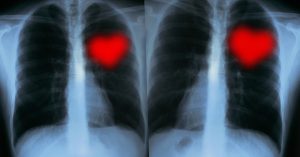Coronary Heart Disease: What Is It and How Is It Treated?
Related: The Dangers of High Cholesterol
Signs of coronary heart disease include chest pain, also known as angina, and shortness of breath. Chest pain results from a lack of oxygen-rich blood reaching the heart, whereas shortness of breath results from a lack of oxygen-rich blood reaching the rest of the body. However, many people experience no symptoms at all until a blocked artery or blood clot caused by plaque build up leads to a heart attack. This is why it’s so important to consult a heart doctor in Tampa Bay if you believe you are at risk for coronary heart disease. There’s no telling how a person’s heart is affected until they consult a medical professional.
Related: 5 Reasons to Undergo a Stress Test
At Ascent Cardiology Group, our surgeons can perform cardiac catheterization to gain access to the heart, diagnose heart conditions, and perform surgical procedures, if necessary. We can also perform echocardiography and stress tests to assess the heart’s structure and function without the need for surgery. Although there are numerous diagnostic and treatment options available, they are only helpful when patients take the first step by scheduling an appointment with a heart doctor. If you are suffering from or believe you are suffering from coronary heart disease, schedule an appointment with Dr. Sachin Diwadkar, FACC, FASE, the best heart doctor in Tampa Bay, to get a clear picture of your heart health and what to do next.
The content, views, and opinions communicated on this website do not represent the views of Ascent Cardiology Group. Reliance on any information provided by this website is solely at your own risk. Although this website contains links to other medical websites, this is strictly for informational purposes. Ascent Cardiology Group is not responsible nor do they approve of the content featured on any third party linked websites referenced on this website.

Stress and Heart Disease: What You Can Do to Improve Your Heart Health
Working long hours, filling up free time, and taking on additional responsibilities is a way of life for Type A

What is Nuclear Cardiology?
Nuclear cardiology is a subspeciality of general cardiology that involves the use of radioactive substances and advanced medical imaging modalities

Coronary Heart Disease: What Is It and How Is It Treated?
In addition to being the most common type of heart disease, coronary heart disease is the deadliest. In fact, it’s
Maintaining Your Cardiovascular Health May Prevent Cognitive Decline
• Eat a wide variety of nutrient-rich foods
• Limit saturated fats, sodium, red meat, and sugar-sweetened beverages
• Limit alcohol intake
• Adopt a physically active lifestyle
• Don’t smoke, vape, or use tobacco products
With regard to exercise, you should aim for at least one hundred and fifty minutes of moderate physical activity, seventy minutes of vigorous physical activity, or an equal combination of the two for each week, if possible. Harvard Health Publishing states that, in addition to relieving anxiety and depression, regularly engaging in an exercise program has been shown to improve cognitive function in those with memory problems or who carry the APOE4 gene variant for Alzheimer’s.
Related: The Dangers of High Cholesterol
While there is no cure for high blood pressure, there are lifestyle changes you can make to enhance your quality of life and reduce your risk for cardiovascular disease and cognitive decline. First and foremost, you should be regularly monitoring your blood pressure to remain alert to any changes or patterns. Then, through a combination of managing your stress, maintaining a healthy diet, and communicating with your healthcare provider, you can successfully live a heart-healthy life. Related: How High Blood Pressure Affects Your Heart and Body
To reduce stress and stimulate your mind, try focusing on patterns of positive thought. Laughter has been found to reduce inflammation in the arteries and lower levels of stress chemicals. Similarly, exercise can lower your blood pressure and produce endorphins. All you need to do is find the right combination of techniques which work for you, whether it be meditating or playing a sport. For additional recommendations on what preventative measures may work best for you, contact a Tampa heart specialist from Ascent Cardiology Group today.
The content, views, and opinions communicated on this website do not represent the views of Ascent Cardiology Group. Reliance on any information provided by this website is solely at your own risk. Although this website contains links to other medical websites, this is strictly for informational purposes. Ascent Cardiology Group is not responsible nor do they approve of the content featured on any third party linked websites referenced on this website.

Stress and Heart Disease: What You Can Do to Improve Your Heart Health
Working long hours, filling up free time, and taking on additional responsibilities is a way of life for Type A

What is Nuclear Cardiology?
Nuclear cardiology is a subspeciality of general cardiology that involves the use of radioactive substances and advanced medical imaging modalities

Coronary Heart Disease: What Is It and How Is It Treated?
In addition to being the most common type of heart disease, coronary heart disease is the deadliest. In fact, it’s